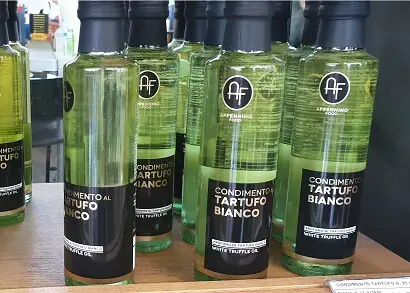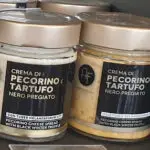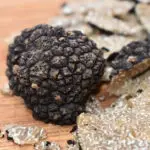Truffles are some of the most exotic and expensive foods on the market, which is why some people choose to use truffle oils rather than an actual plant to infuse their food with that unique truffle essence.

White truffle oil – usually a high-quality olive oil into which truffles have been infused – is considered an excellent and more affordable method for imparting the truffle flavor into different dishes.
For more about white truffle oil and its uses, read on.
What is White Truffle Oil?
White truffle oils are made from food-grade oil – such as olive oil – and either dried or fresh truffles. The truffles are infused into the oils, to impart the complex and delicate flavor of the fungus into the oils.
Once infused with that unique flavor of white truffles, white truffle oil can be used in a variety of dishes.
What is White truffle Oil Used For?
White truffle oil can be used in a variety of ways, some of them quite unexpectedly. It’s often used as a finishing oil in things like risotto and ricotta gnocchi.
It’s also used to add flavor to salad dressings, especially vinaigrette dressings, and to things like prosciutto and roasted garlic pizza.
There are even recipes that add white truffle oil to things like:
- Truffle fries
- Roasted potatoes
- Mashed potatoes
- Truffle gnocchi
- Eggs
- Soups
- Pasta
- Popcorn
- Truffle balsamic vinegar
In short, white truffle oil is a highly versatile ingredient, often used to impart rich flavors even to relatively bland foods.
What Is Black Truffle Oil?
Black truffle oil is usually made with high-quality extra virgin olive oil or similar quality cooking oils, which are then infused with the truffle essence from either dried or fresh black truffles.
Black truffle oil is known to contribute a strong earthy flavor to dishes that it’s added to and is said to have something of a buttery taste.
What is Black Truffle Oil Used For?
Black truffle oil is generally used in heavier dishes or spicy items like hot sauces. The strong flavor works particularly well with foods like:
- Meats
- Heavier salad dressings
- Tomato sauces
- Mac and Cheese
- Hummus
- Finishing oil on a pizza
White vs. Black Truffle Oil: What’s the Difference?
The primary difference between black or white truffles and the oils created with them is the taste, and the complex flavors imparted by the specific chemicals which are extracted and permeate the oil.
The primary compound needed for white truffle oil is 2,4-Dithiapentan, similar to compounds found in broccoli, onion, garlic, and mushrooms.
The primary compound found in black truffle oil to give it its flavor is dimethyl sulfide, which gives a distinctly different taste.
Uses of White Truffle Oil vs Black Truffle Oil
Black truffle oil and white truffle oil are generally used for different dishes, due to the difference in flavors and intensity of flavor.
White truffle oil is usually used for light recipes, and dishes to which chefs want to add a nice, earthy kick.
The favorite dishes for using black truffle oil involve heavier recipes, which require a deeper, richer flavor.
Can You Use White Truffle Oil for Black Truffle Oil (and visa-versa)?
While there are areas where white truffle oil and black truffle oil shouldn’t be interchanged, there are also several areas of gourmet cooking where they overlap. For example, both have been used as finishing oils for pizza.
Professional chefs have also used both types of truffle oils on dishes such as:
- Salads, to enhance the flavors of the vegetables
- Pasta dishes
- French fries
- Mashed or roasted potatoes
- Eggs
- Popcorn
It’s safe to say that, although each type of truffle oil has its own unique flavor, there are many areas of cooking where they have the potential to overlap.
Synthetic vs. Natural Truffle Oil?
Because even the most common actual truffle is expensive, man-makers of truffle oil have started working with synthetic truffle oil, producing commercial truffle oil containing compounds that are similar to those produced by truffles.
Synthetic truffle oils can be produced in one of two ways. The first is by using similar compounds from other, more common vegetables, such as broccoli, onions, garlic, and mushrooms.
The second method is to use 100% synthetically produced truffle flavoring. Most completely synthetic truffle-flavored products have a base in petroleum products.
Is Synthetic Truffle Oil as Good as Real Truffle Oil?
Many connoisseurs of real truffles feel that synthetic products lack the complex taste that comprises a true truffle flavor. Synthetic oils have been described as having a one-dimensional flavor, that often tastes too pungent, or not quite right.
However, given the short supply of truffles, and their cost, chefs who use synthetic oils recommend using the ones that are made from compounds of other vegetables with similar properties. This gives a more natural taste.
Using the vegetable-based synthetic is also said to give more of the appropriate aroma, more similar to a real truffle aroma.
Truffles – It’s all about the smell!
The sense of smell is often tied heavily to the sense of taste, so the aroma of a particular dish can often influence how it tastes.
Whether you use black truffles or white truffles, it’s good to know what kind of truffle aroma you’re likely to get, and the same goes for truffle oils.
Note: Because of the way truffle oil is produced, most truffle oils will have undertones of the olive oil that forms the base, as well as the flavor of the truffles they’re infused with.
White Truffles
White truffles and white truffle oil are described as having an earthy aroma, often with a hint of fresh garlic. Fresh truffles are said to produce aromas along the lines of oaky, nutty, and even sometimes slightly sweet, with a pungent and complex scent.
Black Truffles
Black truffles and black truffle oil are described as having a robust and earthy flavor, often compared to a buttery or garlicky aroma. They’ve also been described as having a flavor and aroma similar to an olive, or a mushroomy aroma.
How Much Does Truffle Oil Cost?
The price of truffle oil covers a wide range, from bottles you can buy at Walmart for about $9, to top-shelf gourmet brands that can cost over $200.
While a higher-priced bottle is more likely to contain all-natural ingredients, it can be hard to determine which is the best brand for you if you’ve never tasted a truffle, or truffle oil before.
If you’ve never cooked with truffle oil before, you may want to do some research and see what types or brands of oil are recommended for whatever dish you’re trying to make.
Cooking with Truffle Oil
If you’re going to start cooking with truffle oil, there are a few things to keep in mind, to get the best experience for you and any diners you share your creation with. Tips from professional chefs include:
- Choose a truffle oil that has natural ingredients, and tells you what they are, even if you don’t choose one that is 100% natural.
- The flavor of truffle oil, like truffles, is destroyed by heat. You don’t actually want to be cooking with the oil. Instead, add it at the end of the process, like you would a seasoning or garnish.
- The shelf life of truffle oil, once opened, is usually a couple of months, but it lasts the longest when stored in a cool, dry place.
- Truffle oils have a strong flavor, so it doesn’t take much to give you the flavors you are looking for.
Final Comments
White truffle oils offer an interesting and complex flavor that can complement a number of dishes. If you’re looking for a new ingredient to add a little extra to a wide range of meals, this might provide the flavor you’re looking for.
- The Top Restaurants Specializing in Truffle Dishes - August 10, 2023
- Truffle Panna Cotta: A Decadent Dessert Recipe for Truffle Lovers - August 7, 2023
- Truffle Scrambled Eggs: A Luxurious Breakfast Delight - August 7, 2023








